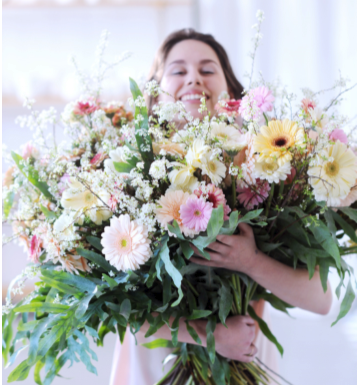Flower Impact: Power of giving flowers
Posted by:
 scentandviolet
May 25th, 2018
scentandviolet
May 25th, 2018
Rutgers University researcher Jeannette Haviland-Jones, Ph.D., director of the university’s Human Emotions Lab, explored what the gifts we choose say about who we are and whether they affect how we are perceived. The research reveals that those who send flowers, in comparison to other gifts, are viewed as successful, caring and emotionally intelligent people.
***

Happy birthday, congratulations, get well soon, thank you, I love you, I am thinking of you, sorry for your loss, just because, new baby, new puppy... Each day, millions of gifts are exchanged by people who want to send thoughtful regards to deserving friends and loved ones. According to research from Rutgers University, the presents we pick to convey our special messages say a lot about us.
The research reveals that those who send flowers, in comparison to other gifts, are viewed as successful, caring and emotionally intelligent people. More specific findings include:
- Both men and women who give flowers are perceived as happy, achieving, strong, capable and courageous people;
- Men and women come across as more emotionally intelligent; they give the impression they can effectively express their feelings and take time to understand the feelings of others;
- Female floral gifters are viewed as more appreciative of beauty and nature.
“Our findings show that you can influence and change what people think of you in a significant way through the gifts you give,” says Haviland-Jones. “That news is particularly important to those interested in enhancing friendships and romances, even business relationships.”
Discovering the scientific power of flowers is not new to Haviland-Jones. Previous Rutgers University research conducted by her team found that flowers create instant delight and happiness, and increase enjoyment and life satisfaction. Specifically, upon receiving a gift of flowers, the female study participants responded with true smiles and reported positive moods that lasted for days. The presence of flowers also led to increased contact with family and friends.
“Flowers have evolved to activate positive emotional responses from people,” says Haviland-Jones. “Each bloom has the potential to put a smile on our face and sway our opinion of a friend, colleague or loved one. That’s powerful.”
Methodology
Jeannette Haviland-Jones, Ph.D., of Rutgers University, and her research team investigated the personal and perceived impact of gift-giving. The study recruited 150 ethnically diverse female study participants, who had a median age of 47. Participants studied 12 personal profiles (six men and six women), including contributions to work, charity and family, with the sole variable being the types of gifts they give – flowers, gourmet food or luxury items such as jewelry. Each profile was evaluated on positive and negative emotion, aesthetic appreciation, emotional intelligence and achievement.
About the Researcher
Jeannette Haviland-Jones, Ph.D., is a professor of psychology at Rutgers University and the director of its Human Emotions Lab. An internationally recognized authority on the role of emotional development in human behavior and nonverbal emotional signals and response, Haviland-Jones has published several books on adolescence and emotion and is co-editor of the Handbook of Emotion, for which she won a Critics Circle Award.
***
Special thanks to The Society of American Florists (SAF) for providing this research synopsis.

